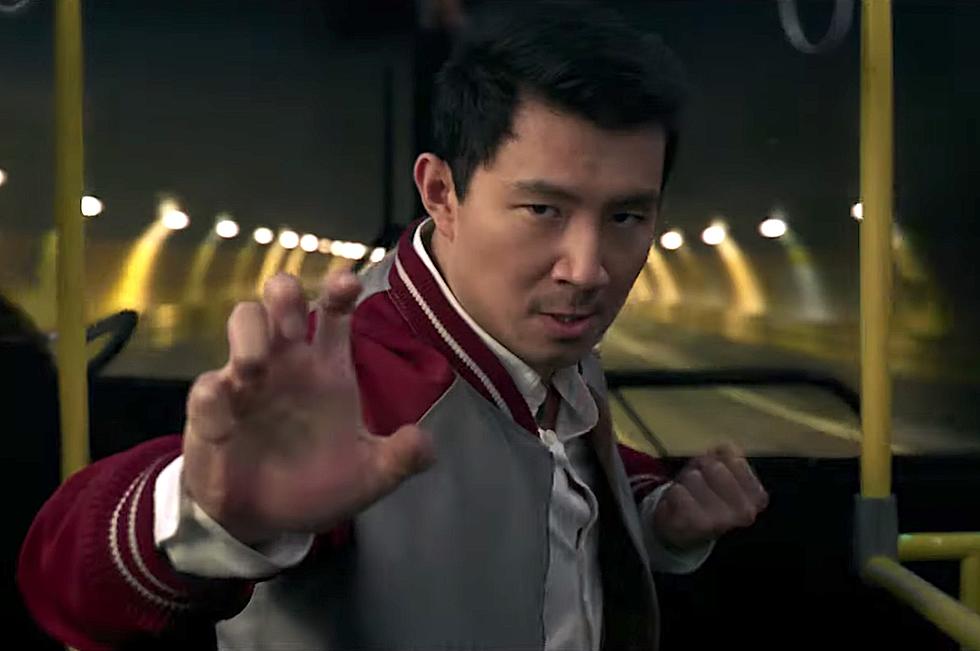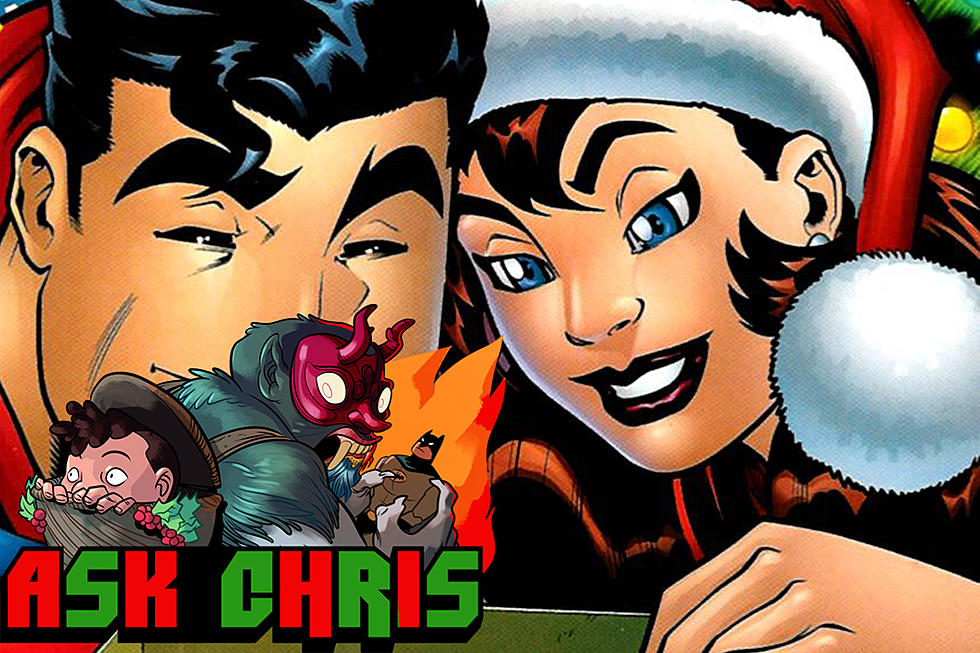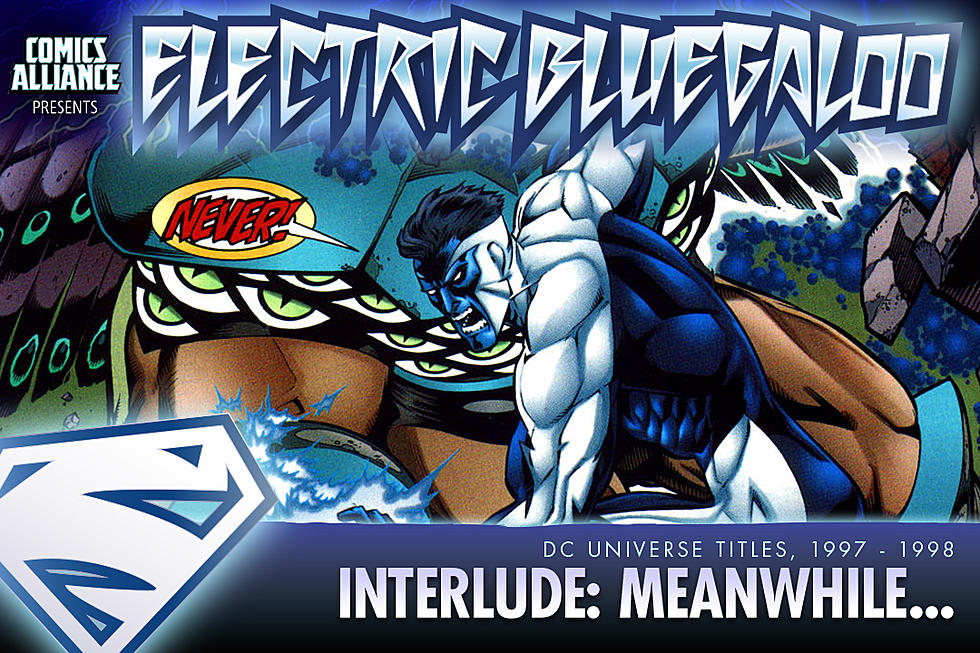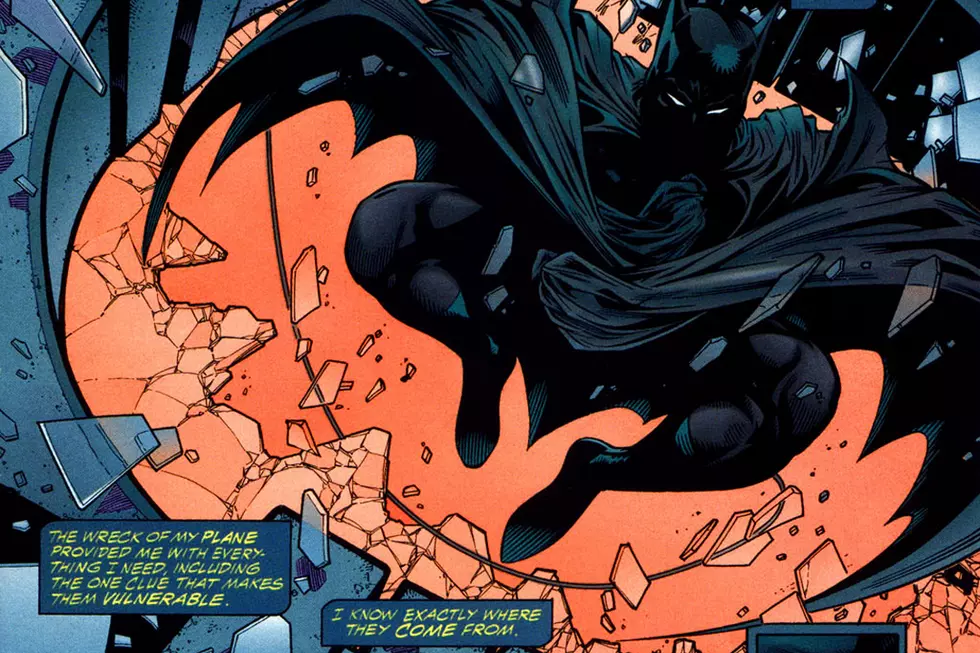
Hot Ink — Shang-Chi #1, JLA 80-Page Giant, Die Hard: Year One
ComicsAlliance's Chris Murphy reviews the biggest -- and best -- books coming out this week.
HE KNOWS KUNG FU AND A PLACE YOU CAN GET GREAT HOT DOGS -- Shang-Chi: Master of Kung Fu #1
 The title of the first story in this one-shot anthology is "Shang-Chi: Master of Kung Fu & Deadpool in: The Annual Race to Benefit Various and Sundry Evil Organizations and Also the Homeless (Now With Beer and Hot Dogs)."
The title of the first story in this one-shot anthology is "Shang-Chi: Master of Kung Fu & Deadpool in: The Annual Race to Benefit Various and Sundry Evil Organizations and Also the Homeless (Now With Beer and Hot Dogs)."
So I hope you believe me when I highly recommend that you read this book.
I'd read maybe one Shang-Chi story before, so when the first story of the book ends up being what'll probably be my favorite Shang-Chi story of all time -- well, that's quite an act for the next two to follow, and they don't quite live up to it.
That first tale, written by Jonathan Hickman with art by Kody Chamberlin,begins with Shang-Chi about to defend his title for a fourth consecutive year in a motorcycle race organized by "the Black Santas of the Damnation Army." The race itself covers three U.S. states and parts of Mexico, and the competition includes, among others, the Black Santas themselves, a group of cross-dressing cat-themed professional wrestlers, and "the Hitler twins from Pittsburgh."
This year, though, Shang-Chi's opponents have become so fed up with the kung fu master spoiling their event that they've hired Deadpool to race against him. Shang-Chi and Deadpool trade off narration duties as the track takes them through a treacherous labyrinth in a forgotten city, a border-crossing tunnel that is the stuff of nightmares, and then past "Sodom's Diner," a roadside greasy spoon with curbside service and the most delicious hot dogs in the world. But it's probably for the best if you don't know all seven meats that go into making them. While the story may take some liberties with more traditional portrayals of the character, it was hilarious and I found myself cracking up on almost every page.
The other two stories in the collection are fine. Mike Benson, Tomm Coker and C.P. Smith's "Once Upon a Time in Wan Chai" does a surprisingly good job of capturing the feel of a Hong Kong action movie considering it's all done in black and white. Choosing to not provide English dialogue in word and thought balloons, instead placing translated subtitles below them, is a weird touch that actually works.
Charlie Huston and Enrique Romero's "The Vacuum of Memory" is more of a nod to the original Shang-Chi comics, which isn't really my thing but fills out the collection nicely. Add in a text only article on martial arts by Shang-Chi himself (really Robin Furth) followed by a mock learn martial arts at home ad, and the whole compilation's end result is an anthology book with a little something for everyone.
"TIME TRAVEL ALWAYS GIVES ME A HEADACHE" IS AN ACTUAL, ACCURATE LINE IN - Justice League of America 80-Page Giant
 DC marks a return to an old tradition this week by releasing the first in a new series of 80-page extra length issues. And in a fitting move, they've built this issue around time travel, using a centerpiece story where the Justice League fights time-hopping supervillain Epoch and end up scattered throughout history as a result. Pairs of heroes are sent back to different eras where they meet some familiar heroes and villains in the past before being whisked back to the present. If any point in the previous paragraph made you think "uh-oh, time travel," well, then this may not be the book for you.
DC marks a return to an old tradition this week by releasing the first in a new series of 80-page extra length issues. And in a fitting move, they've built this issue around time travel, using a centerpiece story where the Justice League fights time-hopping supervillain Epoch and end up scattered throughout history as a result. Pairs of heroes are sent back to different eras where they meet some familiar heroes and villains in the past before being whisked back to the present. If any point in the previous paragraph made you think "uh-oh, time travel," well, then this may not be the book for you.
Reading superhero comics tends to make the suspension of one's own disbelief a necessary exercise. There is, of course, the section of the fan base that gets a lot of pleasure from pointing out each and every logical flaw in a superhero book. If that's how they enjoy their experience, they should be free to, but I'm not one of them.
But even fans willing to let creators push physics, logic and character consistency right up to their breaking points in the pursuit of telling a good story are going to draw the line somewhere. And for many, that line's going to involve time travel. It's a tricky subject to dance around without confusing some readers and drawing stern questions from others. And so when six different creators all do their own time travel stories, there's an amount of stepping on each others' toes going on in what's already a narrative mine field. Take, for example, the obligatory discussion about how time travelers shouldn't interfere with history. Unless they're already predestined to be in this place at this time, in which case they most assuredly do need to interfere. It's somewhat interesting when it gets rolled out the first time. The next five times, progressively less so.
There are some fun moments. The highlight is the story written by Chuck Kim and pencilled by Justin Norman where Firestorm and Green Arrow fight Ra's Al Ghul in 1942. The reason it's the high point, though, is the fact that the two heroes come to the aid of "The Bride." She's a four armed Bride of Frankenstein look-a-like who wears a jetpack, shoots three guns at once, and needs to appear in more comics doing both of those things.
Oh, and the moment where Green Arrow admits he's basing his knowledge of the consequences of time travel on an episode of Star Trek is priceless. The other fun parts of the issue come as a result of the relationship between Snapper Carr and Cheetah in the central story that begins and ends the book. The two are apparently still an item following their end-of-the-world fling during "Final Crisis," and it's kind of adorable considering he's a D-list superhero with a confidence problem and she's an unrepentantly evil supervillain who stays by his side because she's also an unashamedly horny catgirl wearing crotchless pants. Proving once more that true lust conquers all.
But then there are the moments at which I couldn't help but shake my hand. I'll focus mostly on the worst offender, in which Wonder Woman and Steel are sent back to the 16th century Caribbean. Wonder Woman arrives two months ahead of John Henry Irons, and she sets about searching the oceans for any others sent back in time with her. In her own words, this is the exact course of action she took: "Fortune not smiling on my circumstance. My fate determined. So of course I became a pirate! Assembling a crew of women from the area -- prostitutes, the homeless, and thieves, I gave these downtrodden souls a purpose and hope."
Now, correct me if I'm wrong here, but by definition a pirate is "one who undertakes piracy," and piracy, if I'm not mistaken, is "robbery and/or illegal violence at sea." So essentially Wonder Woman's upgraded the local thieves and prostitutes into ocean-going murderous thieves. And just in case you're thinking they might be playing around so that no one messes with them, the all female crew is introduced by the only male pirate on the ship as able to "bite, stab, and kill you just as any man you'll come across." So while I know the Johnny Depp moves made pirates cool as far as today's kids are concerned, it really needs to be pointed out that if you're a pirate, it means that you're stealing from people and possibly killing them in the process. Because there's another word for people who ride around on a boat but don't steal or murder, and it's "sailor."
So, you know, way to give those women a new purpose, Wonder Woman. Oh, and if you're hoping that maybe this whole ordeal will give these women newfound confidence and strength once Wonder Woman returns to the future, you should probably also know that she's leading her crew on what she kno
ws is a suicide mission, and they're almost all killed at the end. So, again, to summarize, after going back in time and stressing the need to keep a low profile, Wonder Woman trains a crew of pirates and then gets them all killed. And I'm not even a hundred percent sure that's the worst thing that happens in this book, because in another story we have to watch a scene where Black Canary goes back in time and gets hit on by her grandfather. Thanks time travel. You're altered history and made us all perverts.
Oh, and also, in a book that used just about every major DC superhero, there was no Batman. Lose ten points.
NEW YORK PROBABLY DOESN'T HEART YOU BACK -- Die Hard Year One #1
 This week BOOM! Studios releases the first issue of its prequel series "Die Hard: Year One," hopeful that moving a Bruce Willis project from film to comic will be more successful than when someone went in the opposite direction and ended up with the motion picture adaptation of "The Surrogates."
This week BOOM! Studios releases the first issue of its prequel series "Die Hard: Year One," hopeful that moving a Bruce Willis project from film to comic will be more successful than when someone went in the opposite direction and ended up with the motion picture adaptation of "The Surrogates."
On board are writer Howard Chaykin and artist Stephen Thompson. Chaykin's a veteran writer with a penchant for gritty crime stories, so he's not a bad choice to tell the story of John McClane's early days as a rookie beat cop in New York City. But the first issue doesn't actually have much of McClane in it, as instead characters are introduced and put into place for the chaos that's likely to follow.
What is clear about the book is that it's a love letter to New York, a city that at the best of times tends to have abusive relationships with people. But in this case it's a love letter to '70s New York, specifically July, 4, 1976, which was like New York when it came home raging drunk at three in the morning only to remember that time it caught you checking out Boston. And if you find that lighthearted, off the cuff remark about domestic abuse distasteful, then boy are you going to be unhappy when you're first introduced to Officer Peter Noonan and his wife, Shelly.
Seventies New York here is an urban jungle where those who are tough and know which rules can be bent are the ones who're going to thrive, and everyone else is going to get preyed upon. In one of the scenes highlighting this, McClane tackles a pickpocket who's taken advantage of a couple of unsuspecting tourists. And while I, as a New Yorker, don't necessarily condone behavior that benefits tourists in any shape or form, I'll admit that that scene was the moment in the book that gave a sense of familiarity, a feeling that this was the John McClane I knew and that there was a spiritual connection between this book and the Die Hard films.
On the whole, though, I can't say there's enough here for me to get a feel on what direction this is headed. The atmosphere's been set, and while something's afoot involving suspicious cops and wealthy power-brokers, the specifics aren't there yet. The creative team's shown the ability to craft a convincing gritty New York and Chaykin's busied himself with creating supporting characters to fill the drama ahead, but until I know what that is I can't suggest this one for any but the most...
You know, I was about to make a terrible pun there and ultimately decided I wouldn't have been able to ever forgive myself if I had. So I'll just say that at this point you should only pick this one up if your firstborn's first name is John and their middle name is McClane. Especially if you've only got a daughter.
More From ComicsAlliance









